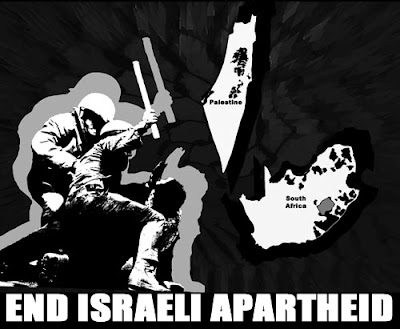South Africa
Salim Vally: The campaign to isolate apartheid Israel -- lessons from South Africa

By Salim Vally
[Salim Vally, a leading member of the Palestine Solidarity Committee in South Africa and a veteran anti-apartheid activist, will be a featured guest at the World at a Crossroads conference, to be held in Sydney, Australia, on April 10-12, 2009, organised by the Democratic Socialist Perspective, Resistance and Green Left Weekly. Visit http://www.worldATACrossroads.org for full agenda and to book your tickets.]
Who said nearly 50 years ago that Israel was an apartheid state?
By Ronnie Kasrils
"...a colonial racist mentality which rationalised the genocide of the indigenous peoples of the Americas and Australasia, in Africa from Namibia to the Congo and elsewhere, most clearly has its parallels in Palestine."
March 17, 2009 -- Media Monitors Network -- At the onset of international “Israel Apartheid Week” in solidarity with the embattled Palestinian people, I want to start by quoting a South African who emphatically stated as far back as 1963 that “Israel is an apartheid state”. Those were not the words of Nelson Mandela, Archbishop Desmond Tutu or Joe Slovo, but were uttered by none other than the architect of apartheid itself, racist Prime Minister Dr. Hendrik Verwoerd.
He was irked by the criticism of apartheid policy and British Prime Minister Harold Macmillan’s “Winds of Change” speech, in contrast to the West’s unconditional support for Zionist Israel.
South Africa: A critique of the ANC and COPE election manifestos

On April 22, 2009, South African vo
The Congress of South African Trade Unions (COSATU) is humbled by the inspirational messages from all over the world for our boycott, sanctions and divestment campaign against Israel.
South Africa: Victory for workers' solidarity as Israeli ship sneaks out of Durban still loaded

Congress of South African Trade Unions and Palestine Solidarity Committee (South Africa)
[See http://links.org.au/node/888 for more background information.]
February 6, 2009 -- The Congress of South African Trade Union (COSATU) is pleased to announce that its members, dock workers belonging to the South African Transport and Allied Workers Union (SATAWU), achieved a victory last night when they stood firm by their decision not to offload the Johanna Russ, a ship that was carrying Israeli goods to South Africa. This, despite threats to COSATU members from sections of the pro-Israel lobby, and despite severe provocation.
South African dockworkers announce ban on Israeli ship; Palestinians salute decision

FREE PALESTINE! ISOLATE APARTHEID ISRAEL!
The Congress of South African Trade Unions (COSATU) and Palestine Solidarity Committee (PSC) launch Week of Action for Palestine supported by the Young Communist League and other progressive organisations
February 3, 2009 -- In a historic development for South Africa, South African dock workers have announced their determination not to offload a ship from Israel that is scheduled to dock in Durban on Sunday, February 8, 2009. This follows the decision by COSATU to strengthen the campaign in South Africa for boycotts, divestment and sanctions against apartheid Israel.
The pledge by the South African Transport and Allied Workers Union (SATAWU) members in Durban reflects the commitment by South African workers to refuse to support oppression and exploitation across the globe.
January 20, 2009 – In a few hours, Barack Hussein Obama will be sworn in as president
South Africa's new opposition party: Face to face with `Terror'
The following was presented by social movement activist Ashwin Desai as part of t
COSATU leader Zwelinzima Vavi: Sanction and boycott apartheid Israel!

Protesters call for boycott of apartheid Israel, Johannesburg, January 2, 2009.
By Zwelinzima Vavi, general secretary, Congress of South African Trade Unions (COSATU)
January 14, 2009 -- From our own experience, we know how painful and dehumanising is the system of segregation, otherwise known as apartheid. Apartheid is a system based on the assumption that one group or race is superior to others and therefore has a right to all the privileges and virtues associated with that particular status. It has a right to run and determine the lives of others, excluding them from certain privileges, merely because they do not belong to the “chosen” group.
What other definition would so fittingly define a system based on different rights and privileges for Jews and Arabs in the Middle East? The bantustanisation of Palestine into pieces or strips -- West Bank, Ramallah, Gaza Strip and so on -- run by Israel and with no rights whatsoever for the Palestinians, is definitely an apartheid system.
Talking points and background on Israel's murderous assault on Gaza
